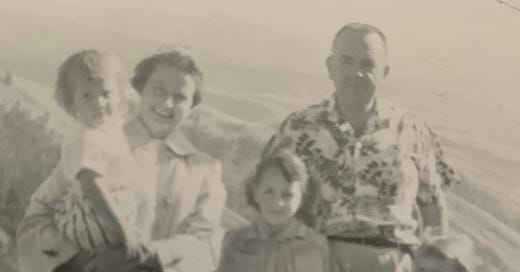My mother died in 2009 at age 92. Our relationship wasn’t perfect, but it was pretty great, and in her last years she was cheerful and happy and hilarious. After she died, one of my sisters and I would text each other and say, I almost called Mom today to tell her something and then I remembered. All these years later, that still sometimes happens.

Mom was not a particularly spiritual person, and nor was she prone to personal reflection or self-help. (My Dad was the opposite—he studied the Kabbala eons before it was trendy.) But she often gleefully repeated a phrase that her own father had taught her: Step by step we travel far.
This phrase has taken on a life of its own since my mother died. I was reminded of that last week, when I attended a party to mark the fifth birthday of the business operated by a friend of my daughter’s. Said friend, Alexis, gave a toast and mentioned how step by step we travel far had become her and her business partner’s motto as they struggled through the early years.
I thought of the other ways this has resonated. For her funeral, my sister the graphic designer made bookmarks with the saying on it and several people have told us they still have those bookmarks saved on a refrigerator or bulletin board. My daughter liked the phrase so much she had it tattooed on her arm.
But I have to admit that sometimes I forget it. (I need to dig one of those bookmarks out and hang it on the magnetic board behind my desk.)
And that is sad, because it is some of the best advice ever. When things get overwhelming, take a step back and remember, all you have to do is take the next step. Doesn’t matter how small it is, all you have to do is take a step. Any step! Because if you don’t have a clue what you’re doing, taking that next step will lead you to another and another and another.
In writing, this can be as simple as writing a word. And then taking the next step, writing the next word. Anne Lamott, in her classic book Bird by Bird, tells how she keeps a tiny one-inch by one-inch empty picture frame by her desk. When she gets overwhelmed or finds herself trying to too much at once, she holds the frame up to her computer and peers through it. This reminds her that all she has to worry about is what fits in that tiny frame.
Aka, the next step.
It works in life, too. Lately when I’m overwhelmed (I’m an Enneagram nine and we tend to get overwhelmed easily) I’ve taken to pausing, taking a deep breath and asking, “What’s next? What’s the next step?” The answer always comes quickly and it is always the right thing to do. (The trick is to follow my inner direction. Sometimes I argue with it, or disobey it. But listening to it always makes life flow better.)
So, try it for yourself. It’s a simple phrase to remember and it will never steer you wrong.
Do you have any pithy sayings that help you remember how to live? I’d love to hear them!
And, also
A note: my father died in 1994, many years before Mom. I’ll never forget something my sister told me after he died. A friend of hers, upon learning of his death and our sadness, said, “You are so lucky to have a father you grieve.” I’ve taken that to heart and tried to be grateful for my parents with all their foibles. My childhood wasn’t perfect (is anybody’s?) but it was damn good and I’m lucky. For those who didn’t have this experience, I’m truly sorry.
Blog Housekeeping

Okay, truth-telling here: I still don’t have this Substack blog thing mastered. As in, not sure how this how paid subscriber thing works (among other things). But I’m working on it. And here’s the big news: my idea for rewarding paid subscribers is classes. Yes, classes. I have several in mind, including one about sustaining a consistent writing practice, one called Mapping the Novel—which will be everything I know about prep work before launching into the actual writing, and one on the Enneagram and writing. Fun times! So keep your eyes out for that, and know that if you have already signed up as a paid subscriber I love and adore you and more is coming soon.





Here's an expression I use almost everyday now (silently in my head). (1) Does it need to be said? (2) Does it need to be said by me? (3) Does it need to be said now? -- a pretty effective way to filter speech and make it thoughtful.